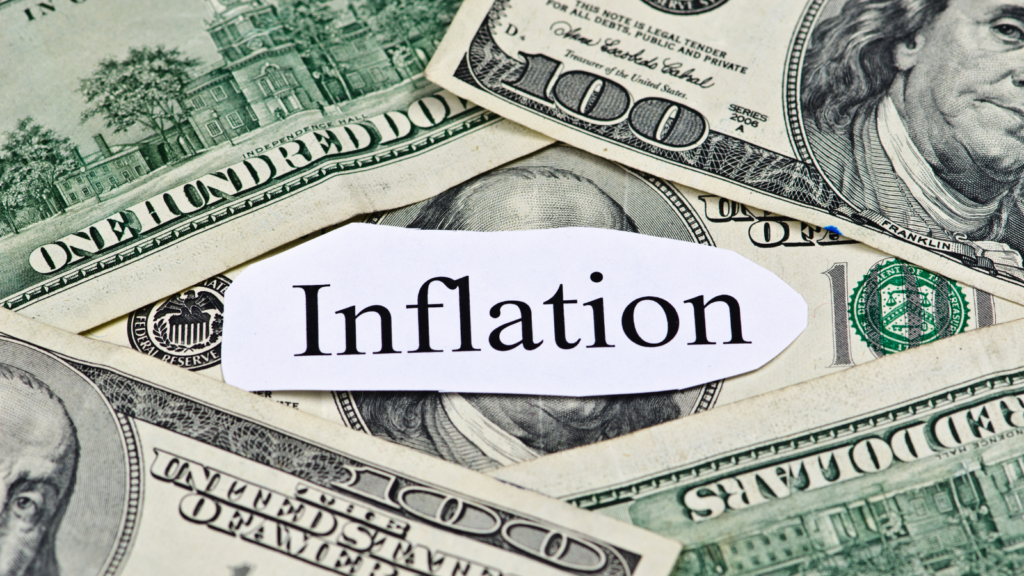Inflation is the increase in the cost of goods and services. This increase reduces the purchasing power of your money. The cost of goods and services has gone up, especially for basic commodities like food, gas, and utilities. And is expected to continue to rise in the wake of the Russian invasion of Ukraine. The inflation topic has received significant attention because rates are at an all-time high we haven’t seen in decades.
Consequently, the real estate market has been affected too. Historically, real estate has been the best bet to minimize the financial impact of inflation. Thus, it was bound to be a continuation of a sellers’ market with many people competing against the limited inventory available. However, while sellers have been celebrating, it hasn’t been the case for buyers. The impact of inflation in the real estate market is felt much more by buyers than sellers.
The typically busy Spring market is expected to be a difficult one for home buyers.
Effect of inflation on home prices
The housing market was already tight, even before inflation. With inflation rates climbing fast day by day, home prices, as well as rents, have been going up steadily. This trend is likely to hold for the foreseeable future. With the existing demand-supply disparity in housing, inflation will push housing prices even higher. Thus, buyers are forced to bid over the asking price to increase their chance of winning the home of their choice. And home sellers continue to enjoy high returns with most homes selling over expected market rates.</span>
What does inflation mean for buyers?
Mortgage rates
Amidst outrageous home prices, buyers have had a reason to smile. The intervention of the Federal Reserve brought down mortgage rates making it possible for many people to afford bigger loans, even with low credit scores. This incentive has been a game-changer for many buyers so far.
We were expecting the Fed to increase mortgage rates at least four times this year to try to manage inflation. However, the Russia invasion has actually caused mortgage interest rates to drop. That decrease is likely to be short-term but with the current global tensions, it’s hard to say.
Decreased homeownership rate
The economy is still recovering post-covid and a considerable number of people who lost their jobs because of the pandemic are still unemployed and in a financial crisis. With home prices rising every day, homeownership remains a dream for many willing buyers, forcing them to continue renting. Researchers in the real estate field predict that if this trend continues, the homeownership rate will dwindle by 62.1% over the next 20 years. As sellers celebrate a booming market, the declining homeownership rate is worrying because it also reflects booming inequality.
Buyers settle for what is available
The high inflation rate and less disposable income have left many people struggling to make ends meet. This has forced many people to review their budgets to remain afloat. Some homeowners have had to sell or downsize to avoid foreclosure. Even with these changes, it hasn’t been smooth sailing for many. Finding a great home hasn’t been easy, especially for those looking for affordable options. The market for mid-sized and affordable homes is highly competitive for some time which means many people have had to settle for what is available as opposed to what they want.</span>
With the drop in home mortgage rates, you can expect that the trend of rising home prices will continue.
Bidding wars
Every buyer hates bidding wars, and it doesn’t help that they are tougher now thanks to the demand-supply imbalance. Also, this means the average buyer is getting multiple rejections before finally winning the bid. Repeated disappointment of not getting the house they wished for causes some buyers to rethink their goals. Perhaps waiting for a future time when buying will be easier. However, buyers will have to put up with this multiple-offer trend for the foreseeable future. The nationwide inventory shortage is expected to continue. There is also a shortage of skilled labor. The continuing supply chain problems are to fault for a shortage in home building, repair, and maintenance issues.
Appliances are on long back orders. It’s so bad that we’ve ordered small appliances like mini-fridges and microwaves to hold in storage. We’re anticipating that they’re going to come in handy soon. When a tenant’s appliances go out we will have a patch to keep them happy while we wait for the replacement to come in.
Offer contingencies
In a sellers’ market, buyers don’t have much bargaining power. Thus, homebuyers have to pick the home closest to what they want from the inventory available. Consequently, lowering expectations may be mandatory. Sellers aren’t likely to go above and beyond to ensure the home meets all your requirements. The average seller is now getting multiple offers that are over the asking price. Having too many requests or contingencies in your home requirements and in your offer will do you no favors.
Property values
Many homes are selling for more than the asking price now. However, don’t bank on making a crazy profit when the time for you to sell comes. An upmarket during your perfect timing isn’t guaranteed. The real estate market is cyclical. It’s safest to buy real estate with the intention of long-term ownership.
The housing market will make an adjustment at some point and housing prices may decrease. Thus, the property value for your home may not be where you want it to be when you sell. If you plan to buy and hold for an extended period of time you still may be okay if you need to sell in a less-than-perfect market.
Listing the home too soon means selling at a loss. And even if you make a profit it may not be as much as you’d hoped for. However, if you wait long enough for a change in the market your return on investment is likely to be better. You will have gained equity during your time of home ownership.
Higher returns
It remains a sellers’ market now which means anyone with a house to sell is reaping big results. Not only are homes selling over the asking price but the marketing time needed to get an offer is shorter.
Unlike in the past when the competition was stiff due to many listings, sellers now don’t have to work very hard to convince buyers to pick their homes. However, this doesn’t mean sellers don’t have to prepare their home for sale.
More demand for bigger homes
With a lot of people working remotely, the need for homes with more space has shot up. Also, many people want to move to the less congested suburbs now that they don’t have to worry about the daily commute to work. This has increased demand for bigger homes and bigger yards, especially in the outskirts of urban areas.
Should I wait to buy once the market recovers?
The ideal time to buy a house varies from one individual to the other. Only you can decide if you should wait or not. Also, even with the skyrocketing housing market, there is still a fair chance of finding a great home within your budget.
You do have to be strategic in your approach. There are things you can do in advance to prepare. Consider your needs and budget when making the decision. Having a mortgage pre-approval before making an offer is a must. Also, making a large down payment tells the sellers you are serious and may put you ahead of other buyers.
You can also wait for the market to recover or opt to buy in a different location if the prices are lower. Picking a house with fewer parameters is also an option if it is what your budget requires. However, if you have enough money to buy a house without compromising your financial stability you’ll certainly have more options.
When will inflation end?
No one wins when the inflation rate is high. Even if you sell a home at a high price your money won’t go far when it comes to expenditures. With goods becoming more and more expensive every day, spending habits are changing.
One way to beat inflation is by changing consumption trends. If more money is spent on services then the supply chain woes will be abated, even in the real estate field. However, mortgage rates have a big impact on this. And at the moment it all comes down to the decision of the Federal Reserve. Buyers remain hopeful that the market will stabilize this year making homeownership more attainable again. And sellers are just fine the way things are.

